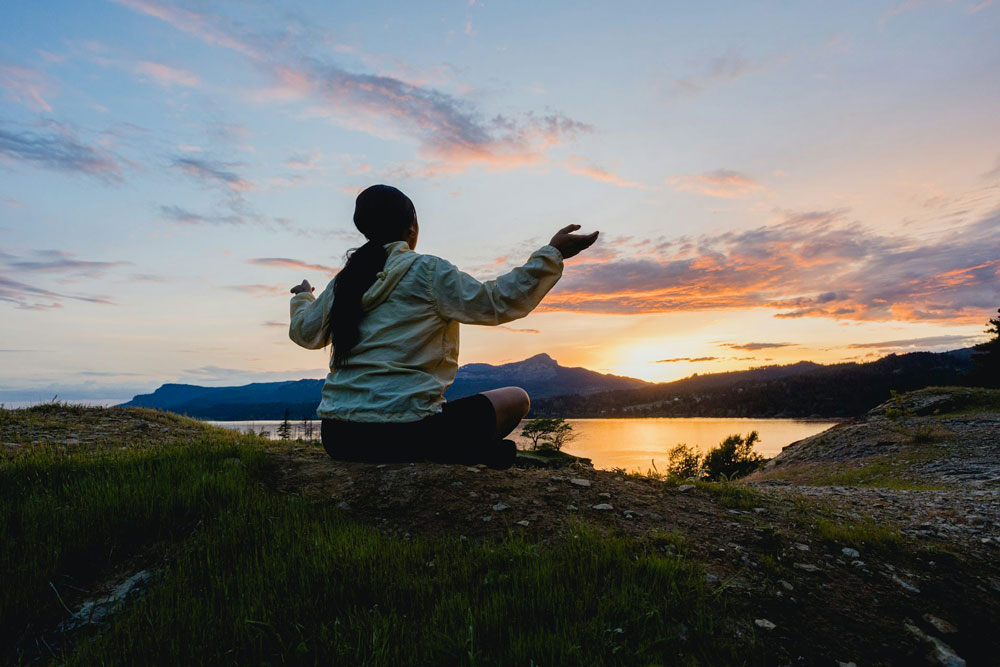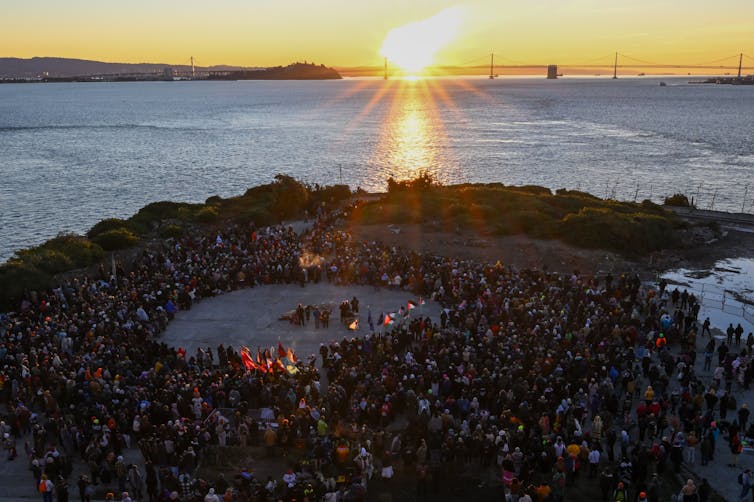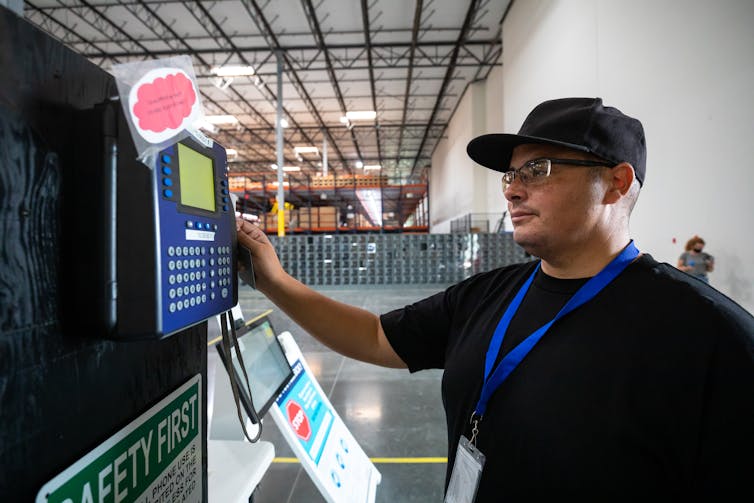
By Rachelle Wilson Tollemar
It is that time again. Time to wonder: Why do we turn the clocks forward and backward twice a year? Academics, scientists, politicians, economists, employers, parents – and just about everyone else you will interact with this week – are likely debating a wide range of reasons for and against daylight saving time.
But the reason is right there in the name: It’s an effort to “save” daylight hours, which some express as an opportunity for people to “make more use of” time when it’s light outside.
But as an Indigenous person who studies environmental humanities, this sort of effort, and the debate about it, misses a key ecological perspective.
Biologically speaking, it is normal, and even critical, for nature to do more during the brighter months and to do less during the darker ones. Animals go into hibernation, plants into dormancy.
Humans are intimately interconnected with, interdependent on, and interrelated to nonhuman beings, rhythms and environments. Indigenous knowledges, which despite their complex, diverse and plural forms, amazingly cohere in reminding humans that we too are an equal part of nature. Like trees and flowers, we are beings who also need winter to rest and summer to bloom.
As far as we humans know, we are the only species that chooses to fight against our biological presets, regularly changing our clocks, miserably dragging ourselves into and out of bed at unnatural hours.
The reason, many scholars agree, is that capitalism teaches humans that they are separate from, and superior to, nature – like the point on top of a pyramid. That, and I argue, that capitalism wants people to work the same number of hours year-round, no matter the season. This mindset runs counter to the way Indigenous people have lived for thousands of years.

Tayfun Coskun/Anadolu via Getty Images
The nature of time and work
Indigenous views of the world are not the pyramids or lines of capitalism but the circles and cycles of life.
Concretely, time correlates with terrestrial and celestial changes. Historic records and oral interviews document that in traditional Indigenous cultures of the past, human activity was scheduled according to nature’s recurring patterns. So for example, a meeting might have been scheduled not at 4 p.m. on Thursday, but rather at the next full moon. Everyone knew well in advance when that would arise and could plan accordingly.
Such an acute sensitivity to nature’s calendar has symbolic meaning, too. To look up and see the Moon in the sky at night is to see the same Moon that someone once saw centuries ago and someone else will hopefully see centuries into the future. Time is interwoven with nature in a sense that far exceeds Western understanding. It embodies past, present and future all at once. Time is life.
In this Indigenous context, daylight saving time is nonsensical – if not outright comical. Time can’t be changed any more than a clock’s hands can grab the Sun and move its position in the sky. The Sun will continue to cycle at its gravitational will for generations – and economic systems – to come.
Like time, Indigenous approaches to work are also more expansive than the capitalist economy’s. They validate and value all life-sustaining activities as work. Taking care of oneself, of the sick, of the elderly, of the young, of the land, or even merely resting, for example, are equally valuable activities.
That’s because the objective of most Indigenous economies is not to increase an economist-invented measurement of production by working from 9 a.m. to 5 p.m., Monday through Friday. Rather, their goal is to find and generate a holistic well-being for all.
Daylight saving time is exclusively designed for 9-to-5 workers. It attempts to boost economic activity by giving them, and them alone, more light. Think about it: Care workers, who are predominantly women, work beyond daylight hours year-round. Where is their temporal accommodation? Though likely not malicious or even purposeful, the political intervention of daylight saving time ignores the massive workforce that operates on the periphery of the mainstream economy. In some ways, it reinforces the discriminatory idea that only some workers are worthy of economic recognition and accommodation.
In this sense, daylight saving time raises the question: Does the economy really need that extra hour of sunshine and worker productivity? Traditional economic philosophies would likely answer no out of principle; they may see daylight saving time as trespassing the biophysical, ethical and sacred limits of the world ecology by encouraging cultures of overwork and overconsumption.

halbergman/E+ via Getty Images
The working of time and nature
Since the invention of the clock, capitalism has increasingly treated time as an inanimate object largely independent of the environment.
While the rest of nature rises and slumbers to lunar and solar cycles, humans work and sleep to the resetting of their artificial clocks.
In their 2016 book “The Slow Professor,” humanities scholars Maggie Berg and Barbara K. Seeber connect this objectification of time to an inhumane culture of work.
Modern workers, they write, are increasingly expected to treat time as a numerical asset that can be managed, measured and controlled. Time for rest and relaxation has no countable home in the capitalist economy of life.
There are certainly practical benefits to using time to measure and monitor economic activities – such as knowing the precise time a meeting is scheduled to start and end. But Berg’s and Seeber’s work reveals how that reasonable practicality has been subverted to hold workers captive within what I argue is an unsustainable, unnatural and exploitative environment. Work time and life time have blurred into one.
In capitalism, work is expected to grow infinitely, despite existing within a finite world inhabited by limited beings. At a time when human activity depletes the world’s ecology – rather than sustaining it as it once did – this around-the-clock approach to work is simply incompatible with nature.
In sum, daylight saving time reproduces the same destructive logic that has led humans and nonhumans into the present socio-ecological crises. Disobeying and dominating the laws, rhythms and shape of nature, as seen in the seasonal exploitation of human energy and labor via daylight saving time, perpetuates the unparalleled social and environmental decline uniquely characteristic to the current capitalist era.
Looking backward, progressing forward
Unlike the relatively recent inception of capitalism, Indigenous wisdom espouses a set of philosophies as old as time. It reminds humans that there are other ways of interacting with time, work and the environment – ways that existed before capitalism and that can exist afterward, too.
In my view, people might be better off if the discussion about changing the clocks in the fall and spring wasn’t about how much time we can “make use of” or how much daylight we might “save,” but rather about reducing the number of hours we are expected to be made useful – and profitable – to secure a more just and sustainable existence for all.
![]()
Rachelle Wilson Tollemar is Lecturer in Spanish Environmental Cultural Studies at the University of Wisconsin-Madison.





























JimboXYZ says
Another way to look at it ? The self proclaimed expert that wrote this article is overlooking one important fact. Of any species on planet Earth, humans are the only one’s that ever really measured time with a wristwatch/clock. Maybe she’s overlooking the fact that animals adjust their lives around the daylight/moonlight hours that have always been the natural system. At +/- closest to the equator there are between 10-14 hours of sunlight. Biologically speaking, there’s at least 8-10 hours of moonlight sleep between sunset & sunrise. That’s the number of hours humans sleep to be considered diurnal & not nocturnal. Some species are nocturnal, that is their days starts when the sun sets. all DST & Standard time is a twice a year ritual to reset a clock for +/- an hour. We all adjust our lives according to the clocks & sunlight we get on any given day of yet another man-made invention called a calendar. We all sleep, eat & do what we do as our roles in the g\rand scheme of things are. A farmer will get up at sunrise to do their chores, go to sleep to do it again after the sun sets. Kids will go to school for +/-6 hours, we wouldn’t want them wandering the streets in the dark to get hit by a car in the dark, would we ?
So every living thing thing on this planet alters their productivity for the sunlight they get for diurnal, moonlight they get for nocturnal. If we go by what nature dictates, the summer months, for the hottest part of the day is a dead spot, Animals avoid the excessive heat from the sun for the warmest months. Just like people do, animals have no HVAC systems, just a watering hole. And the watering hole is also a feeding time of the day for Gators & Crocs, some animals. If one were too truly analyze any species of life form on planet Earth, they will find a relatively lazy animal conserving energy for the hottest stretch of any given day. I would love to debate this with her, but somehow feel the author is most likely a liberal studies snowflake & would be offended. Her own tribe has adapted to the DST/Standard time model of life. What difference does it make what the hands or numbers of any clock indicate. I just prefer to be able to see what’s going on when I go to do something vs limited lighting for limited vision. I do prefer to drive at hours when others are sleeping for darkness. I don’t want to be dodging children in the dark when a car runs them over & will kill them. Nobody wants to go thru that. So the solution is to change a clock and adjust the day so that the rest of the human race is on the same page. Time is nothing more than the best effort to calibrate the cycles of planet Earth as crudely as possible for the millions of miles that the universe spans. Like it or not, to be 1 leap year every 4 years for accurate is pretty good for the calendar. To be +/- an hour for accurate each year is pretty good for a clock. And what the author refuses to acknowledge ? Before DST existed, the Standard time was set up for the same calendar & clocks for time measurement devices. The author is not an expert of anything scientific.
Rachelle Wilson Tollemar is Lecturer in Spanish Environmental Cultural Studies at the University of Wisconsin-Madison. I think the educational system has failed RWT. A lot smarter people than herself & myself have come up with a system that could only be improved upon building upon as a theft of credit for being intelligent enough to be able to get it as accurate as it is. What does she propose, the calendar is 1, 24 hour day off. Are the 4 years between & including a leap year supposed to have and average of 365.25 days per year ? Is the 24 hour clock supposed to be adjusted at 2 AM every night for the sunrise/sunset tables for the sunlight hours. Doing it her way, the hours of a day would have to be adjusted to accurately make sure there were an average of daily sunlight over the course of a year. she needs to stay in her lane. Measuring time just isn’t in her wheel house to do beyond what the rest of us do with a clock. Her whole premise & concept is illogical. I’ll bet she’s the first to use the system to schedule her life to be as productive as she’s become ?
The Obelisk says
Pick one, then, “set it and forget it.”
This is Bullsh.t
Pogo says
@Professor Tollemar (and, FL)
An exceptionally well stated post-mortem, eulogy, and obituary.
BillC says
Instead of 1 hour, why not just set it back 1/2 hr and leave it there all year long.
Jim Luther says
Here’s the fix!
Spring forward 30 minutes and never do it again!